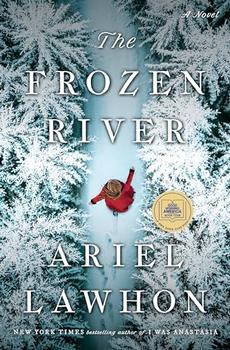Summary | Excerpt | Reading Guide | Reviews | Beyond the Book | Readalikes | Genres & Themes | Author Bio

 Book Reviewed by:
Book Reviewed by:
Maria Katsulos
Buy This Book
A HANGING
I
November 1789
"Truth will come to light; murder cannot be hid long."
—William Shakespeare, The Merchant of Venice
WHAT'S PAST IS PROLOGUE
The body floats downstream. But it is late November, and the Kennebec River is starting to freeze, large chunks of ice swirling and tumbling through the water, collecting in mounds while clear, cold, fingers of ice stretch out from either bank, reaching into the current, grabbing hold of all that passes by. Already weighted down by soaked clothing and heavy leather boots, the dead man bobs in the ebbing current, unseeing eyes staring at the waning crescent moon.
It is a miserable night with bitter wind and numbing frost and the slower the river moves, the quicker it freezes, trapping him in its sluggish grip, as folds of his homespun linen shirt are thrown out like petals of a wilted, brown tulip. Just an hour ago his hair was combed and pulled back, tied with a strip of lace. He'd taken the lace, of course, and it is possible—fate is such a fragile thing, after all—that he might still be alive if not for that choice. But it was insult on top of injury. Wars have been fought over less.
The dead man was in a hurry to leave this place, was in too much trouble already, and had he taken more care, been patient, he would have heard his assailants in the forest. Heard. Hidden. Held his breath. And waited for them to pass. But the dead man was reckless and impatient. Panting. He'd left tracks in the snow and was not hard to find. His queue came loose in the struggle, that bit of lace reclaimed and shoved in a pocket, and now his hair, brown as a muddy riverbank, is a tangled mess, part of it plastered to his forehead, part in his mouth, pulled there during a last, startled gasp before he was thrown into the river.
His tangled, broken body is dragged along by the current for another quarter of a mile before the ice congeals and grinds to a halt with a tired moan, trapping him fifteen feet from the shore, face an inch below the surface, lips parted, eyes still widened in surprise.
The great freeze has come a month early to the town of Hallowell, Maine and—the dead man could not know this, nor could anyone who lives here—the thaw will not arrive for many, many long months. They will call this the Year of the Long Winter. It will become legend, and he, no small part of it. For now, however, they sleep, safe and warm in their beds, doors shut tight against an early, savage winter. But there—along the riverbank, if you look closely—something dark and agile moves in the moonlight. A fox. Tentative, she sets one paw onto the ice. Then another. She hesitates, for she knows how fickle the river can be, how it longs to swallow everything and pull it into the churning depths below. But the ice holds and the fox inches forward, toward the dead man. She creeps out to where he lies, entombed in the ice. The clever little beast looks at him, her head tilted to the side, but he does not return the gaze. She lifts her nose to the sky. Sniffs for danger. Inhales the pungent scent of frost and pine along the river and, farther away, the faintest whiff of wood smoke. Satisfied, the fox begins to howl.
CLARK FORGE
Thursday, November 26
"You need not fear," I tell Betsy Clark. "In all my years attending women in childbirth, I have never lost a mother."
The young woman looks at me, eyes wide, sweat beading on her temples, and nods. But I do not think she believes me. They never do. Every laboring woman suspects that she is, in fact, moments away from death. This is normal. And it does not offend me. A woman is never more vulnerable than while in labor. Nor is she ever stronger. Like a wounded animal, cornered and desperate, she spends her travail alternately curled in upon herself, or lashing out. It ought to kill a woman, this process of having her body turned inside out. By rights, no human should survive such a thing. And yet, miraculously, they do, time and again.
Excerpted from The Frozen River by Ariel Lawhon. Copyright © 2023 by Ariel Lawhon. Excerpted by permission of Doubleday. All rights reserved. No part of this excerpt may be reproduced or reprinted without permission in writing from the publisher.





The House on Biscayne Bay
by Chanel Cleeton
As death stalks a gothic mansion in Miami, the lives of two women intertwine as the past and present collide.

The Flower Sisters
by Michelle Collins Anderson
From the new Fannie Flagg of the Ozarks, a richly-woven story of family, forgiveness, and reinvention.

The Funeral Cryer by Wenyan Lu
Debut novelist Wenyan Lu brings us this witty yet profound story about one woman's midlife reawakening in contemporary rural China.
Your guide toexceptional books
BookBrowse seeks out and recommends the best in contemporary fiction and nonfiction—books that not only engage and entertain but also deepen our understanding of ourselves and the world around us.